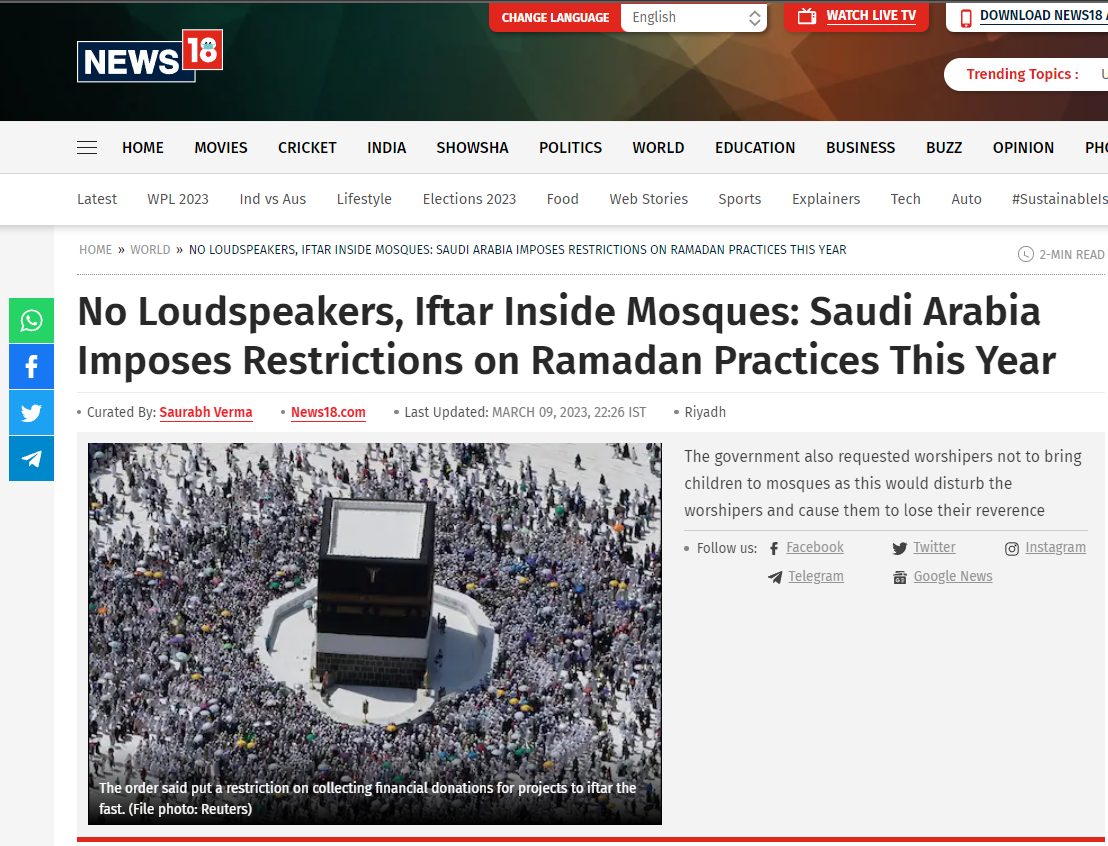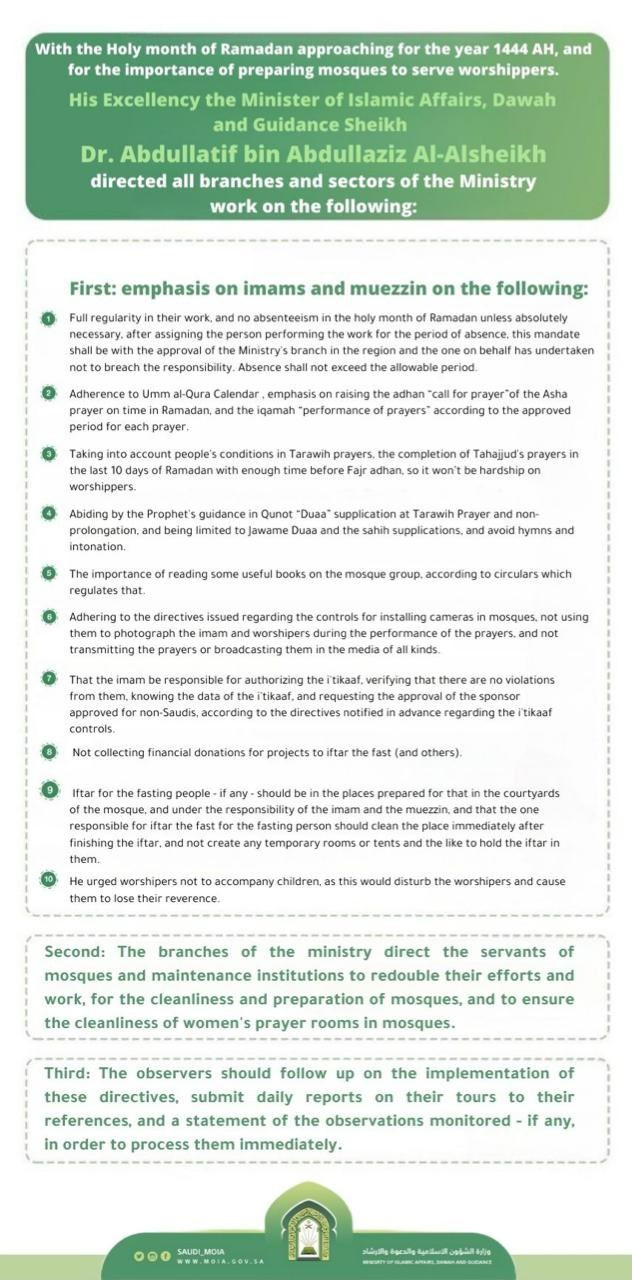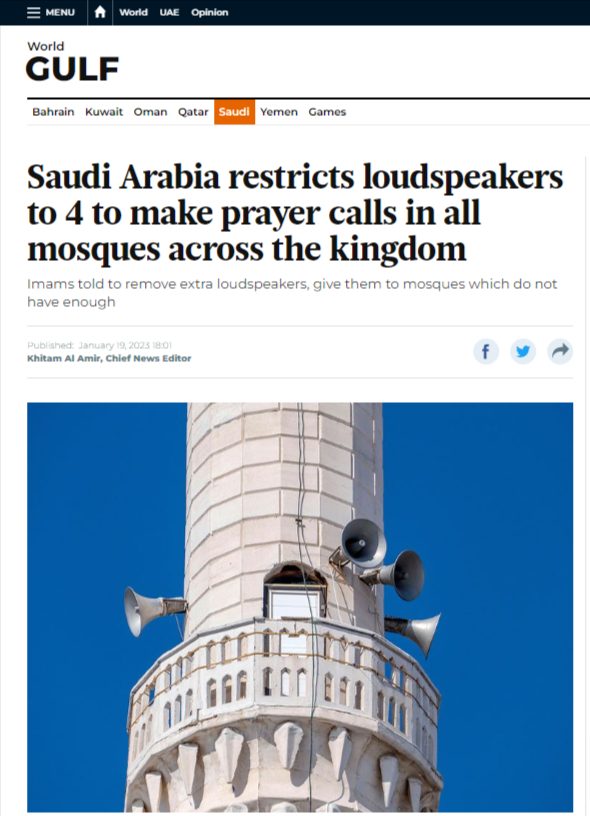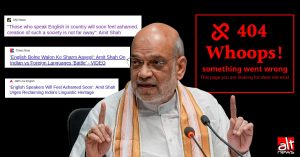The Saudi Arabian minister of Islamic affairs Sheikh Abdullatif bin Abdulaziz Al-Sheikh recently issued a circular underlining the steps to be taken to prepare mosques for the month of Ramadan or Ramzan, the ministry said in a tweet.
His Excellency the Minister of Islamic Affairs #Dr_Abdullatif_Al_Alsheikh issued a circular to all branches of the Ministry of the need to prepare mosques to serve the worshipers, as part of the Ministry’s preparations to receive the Holy Month of #Ramadan 1444AH. pic.twitter.com/uTSJ0Jc5JE
— Ministry of Islamic Affairs 🇸🇦 (@Saudi_MoiaEN) March 3, 2023
The announcement soon triggered a flurry of reactions from various quarters. A tweet and a YouTube video by Sami Hamdi, the founder of The International Interest, a current affairs magazine focusing on the Middle East and North Africa, went viral on the internet. In the video, Hamdi criticizes the orders. Hamdi shared a few pointers and claimed that Crown Prince Muhhamad Bin Salman (MBS) was trying to restrict Ramadan in Saudi Arabia.
Bin Salman announces new orders to restrict Ramadan in #SaudiArabia:
– No loudspeakers
– No broadcast of prayers
– No itikaf without ID (state surveillance on the ‘zealous’)
– Keep prayers short
– No collecting donations
– No kids in mosques for prayers
– No iftar inside mosques pic.twitter.com/D8KBMzIzXo— Sami Hamdi سامي الهاشمي الحامدي (@SALHACHIMI) March 7, 2023
The description of the YouTube video says, “Behind the apparent ‘reasonable’ wording of the English translation of Bin Salman’s new rules on #Ramadan in #SaudiArabia lies an aggressive assault on one of the most central manifestations of Muslim identity.”
Several Indian media outlets reported along these lines.
CNN News18 shared a video of their broadcast coverage of these orders. Their bulletin started with the point that there was an order banning loudspeakers. The caption of the tweet, too, starts with ‘no loudspeakers’.
#BreakingNews | ‘No loudspeakers, No itikaf without ID, No broadcast of prayers & No iftar inside mosques as #SaudiArabia announces a set of rules & restrictions on practice of #Ramadan this year. #Exclusive inputs by @manojkumargupta @aayeshavarma | @AnchorAnandN pic.twitter.com/79jdbmKoLA
— News18 (@CNNnews18) March 10, 2023
News18.com published a story on their web desk reporting on the Saudi government’s ‘restrictions’ on Ramadan. The headline says, ‘No Loudspeakers, Iftar Inside Mosques…’

Other outlets such as ThePrint, Live Hindustan, ABP, India TV and Right Wing propaganda outlet OpIndia also reported on the announcement, among others.
- The Print said in the headline that loudspeakers were not allowed, but the story said there was an order ‘limiting mosque loudspeakers’.
- The Live Hindustan story said in the headline that loudspeakers were banned.
- ABP initially said “रमजान में नहीं सुन पाएंगे अजान! मस्जिदों में लाउडस्पीकर हुए बैन, सऊदी अरब ने लिया फैसला, भड़के मुस्लिम धर्म गुरु” (Azaan will not be heard in Ramzan! Saudi Arabia takes decision to ban loudspeakers, Muslim religious leaders angry.) A day after publishing the story, they updated the story and said “Saudi Arabia ने मस्जिदों में लाउडस्पीकर की आवाज को कम करने का ऐलान किया था. रमजान के महीने में अब अजान लाउडस्पीकर पर दूर तक सुनाई नहीं देगी.” (Saudi Arabia announced reduction in the sound of loudspeakers in mosques. In the month of Ramzan, now Azaan will not be heard from far on loudspeaker.) The original version of the story can be read here.
- India TV said in its headline as well as the report that there was a complete ban on the use of loudspeakers.
- OpIndia said, “Loudspeakers in mosques are prohibited as per this order while worshippers are ordered to do Iftar inside the mosques”.
Major Surendra Poonia, a former special forces soldier in the Indian Army, tweeted the directives. He added a line in Hindi in his caption, that translates to ‘If you do this in India, there will be a storm’.
Crown Prince & PM of Saudi Arabia Mohd bin Salman passed new orders regarding Namaz during Ramadan
-No loudspeakers
-No broadcast of prayers
-Keep prayers short
-No donation collection
-No kids in mosques for prayers
-No iftar inside mosquesभारत में ऐसा करने पर तूफ़ान आ जाये pic.twitter.com/A3xDbtHqep
— Major Surendra Poonia (@MajorPoonia) March 9, 2023
Panchjanya, the mouthpiece of the Rashtriya Swayamsevak Sangh, also tweeted on the issue saying loudspeakers had been banned in Saudi mosques.
सऊदी अरब में मस्जिद पर लाउडस्पीकर लगाने पर लगा बैन !!
इसपर क्या होगी आपकी टिप्पणी ?
कमेंट कर जरूर बताएं। pic.twitter.com/C1IxKYezSd
— Panchjanya (@epanchjanya) March 12, 2023
Many other users made the claim on Twitter that loudspeakers had been completely banned in Saudi Arabia during Ramadan or Ramzan. Some of them asked why India can’t take a similar decision. These tweets can be seen here.
Fact Check
When one reads the set of directives issued on March 3 by the ministry (screenshot below), one can see that there is no mention of loudspeakers.

However, media reports from January this year said that Saudi Arabia had issued directives to restrict the use of loudspeakers in all mosques across the Kingdom. Gulf News wrote that the minister of Islamic affairs had set the number of external loudspeakers at four which are only to be used in mosques to make the prayer calls.

According to the report, loudspeakers can not be used for additional prayers throughout the holy month. The minister “instructed all Imams to remove extra loudspeakers, if any, from mosques and store them in a warehouse for later use or give away to mosques that do not have enough,” it added.
Importantly, the report pointed out that this was not the first-ever effort on the part of the government to ensure that the sound of microphones during prayers did not cause trouble to elderlies and children. “Last year, the ministry issued restrictions on volume levels for loudspeakers at mosques during the fasting month. Speakers must not exceed a third of their maximum volume,” Gulf News says.
We also noted that the order prohibiting iftar inside mosques was nothing new.
Iftar, which is the ceremonial breaking of the day’s fast during the month of Ramadan, is almost always held in the courtyards attached to a mosque, and never inside the shrine. A Google image search with the terms ‘Iftar at Jama Masjid Delhi’ will confirm this.
One can find pictures below of people holding iftar in the courtyards of the Jama Masjid of Delhi and Ahmedabad, respectively.
Regarding iftar, the order says that it should be held at places designated for the purpose in the courtyards of the mosque under the supervision of imams and muezzins and that the place should be cleaned immediately after iftar is over. No temporary tents or rooms should be set up for the purpose.
In a statement to media outlet Middle East Monitor, government spokesperson Abdullah Al-Enezi clarified the ministry’s stance. Rubbishing the claims that iftar was not allowed, he said that it would be arranged in a way that the sanctity and cleanliness of the mosque were maintained. The report can be read here.
Therefore, the claims regarding the ban on loudspeakers in mosques in Saudi Arabia are false. The west Asian country has restricted the number of loudspeakers to four but has not banned their use. And as far as the order on iftar inside the mosque is concerned, it is in sync with age-old tradition.
Incidentally, ABP published a story on March 13 (the same day on which they updated their original report as mentioned above) fact-checking the claim that loudspeakers had been banned. They said that there was no mention of loudspeakers in the recently announced guidelines.
Vansh Shah is an intern with Alt News.
Independent journalism that speaks truth to power and is free of corporate and political control is possible only when people start contributing towards the same. Please consider donating towards this endeavour to fight fake news and misinformation.




